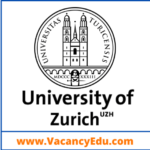University of Dundee, Scotland, United Kingdom invites online Application for number of Fully Funded PhD Degree at various Departments. We are providing a list of Fully Funded PhD Programs available at University of Dundee, Scotland, United Kingdom.
Eligible candidate may Apply as soon as possible.
(01) PhD Degree – Fully Funded
PhD position summary/title: Advanced sensing platforms
Are you passionate about cutting-edge nanotechnology research and its real-world applications? Join our dynamic research team at the University of Dundee’s School of Science & Engineering for a fully funded PhD project in nanomaterials and advanced sensing technologies.
This project focuses on the fabrication of nanomaterial-based substrates using laser-assisted photocatalytic growth of silver and gold nanoparticles. These substrates will be analysed using Surface-Enhanced Raman Scattering (SERS)—a highly sensitive optical detection technique capable of identifying molecular structures with extreme precision.
SERS has vast potential for environmental sensing, biomedical diagnostics and pharmaceutical trace analysis, offering label-free detection with minimal sample preparation. To advance this field, we will develop stable, robust, and cost-effective sensing platforms that can be produced at scale for real-world applications.
You will work in state-of-the-art research laboratories with access to cutting-edge nanofabrication and characterisation tools. You will be part of a thriving research community of scientists and PhD students at the University of Dundee. Through this project, you will develop expertise in nanomaterials, laser processing, and optical sensing technologies, contributing to groundbreaking advancements in real-world sensing applications.
Deadline : 30 September 2025
(02) PhD Degree – Fully Funded
PhD position summary/title: IDP Glue — Capturing disordered protein complexes using sticky small molecules
It is currently estimated that 11% of human proteins are considered druggable using conventional drug discovery approaches. This limitation stems from the reliance on well-defined binding pockets or structured surfaces that enable small molecule binding. However, many proteins that drive disease—such as RNA-binding proteins, transcription factors, and scaffolding proteins—lack these biomolecular features. As a result, they are often deemed chemically intractable and classified as “undruggable.”
To overcome this major barrier, new strategies are needed to therapeutically modulate such proteins, particularly in complex diseases like cancer, neurodegeneration, and autoimmunity.
In this PhD project, you will integrate molecular biophysics, organic synthesis, drug screening technologies, and structural biology to develop chemical tools that stabilize disease-relevant protein complexes in neurodegenerative conditions. Key research questions include:
- Can native protein–protein stabilization relocalize proteins to the nucleus?
- Can novel fragment drug discovery screening approaches accelerate the discovery of molecular glues?
- Can new mechanisms of action for disease-relevant molecular glues be identified and exploited?
Deadline : 5 September 2025
View All Fully Funded PhD Positions Click Here
(03) PhD Degree – Fully Funded
PhD position summary/title: Exploring the evolutionary origins of developmental diseases at single-cell resolution
Many diseases of humans and other organisms are the result of a failure of multicellular organisation (formation of lineage specific body forms) or other growth dysfunctions. To better understand why malfunction occurs on the molecular level, this computational biology project will focus on a phenomenon known as heterochrony which describes how small natural polymorphic changes in gene activity can affect the timing of developmental programs and differences in body formation. Historically, many life scientists have studied how differences in the development of individuals can result in significant natural variation of organismal appearance and function. However, a detailed molecular understanding of heterochrony was never achieved, and we currently lack a clear understanding on the evolutionary origins and molecular mechanisms underlying the heterochronic developmental process.
We are looking for a highly motivated individual who strives as a team player in an interdisciplinary environment and who favours communication and problem solving with other team members and research groups. In this Royal Society Funded project the successful candidate will harness cutting-edge software solutions developed in our team (myTAI2, Drost et al., 2018 and https://github.com/drostlab/myTAI; orthologR, Drost et al., 2015; DIAMOND2, Buchfink et al., 2021; DIAMOND DeepClust, Buchfink et al., 2023; and GenEra, Barrera-Redondo et al., 2023) to establish a new evolutionary transcriptomics framework for molecular heterochrony research at single-cell resolution. This project will extensively work with various developmental transcriptomic datasets ranging from (pseudo-)bulk- to single-cell resolution to detect marker genes of heterochrony.
Deadline : 24 August 2025
About The University of Dundee, Scotland, United Kingdom – Official Website
The University of Dundee[a] is a public research university based in Dundee, Scotland. It was founded as a university college in 1881 with a donation from the prominent Baxter family of textile manufacturers. The institution was, for most of its early existence, a constituent college of the University of St Andrews alongside United College and St Mary’s College located in the town of St Andrews itself. Following significant expansion, the University of Dundee gained independent university status by royal charter in 1967 while retaining elements of its ancient heritage and governance structure.
The main campus of the university is located in Dundee’s West End, which contains many of the university’s teaching and research facilities; the Duncan of Jordanstone College of Art and Design, Dundee Law School and the Dundee Dental Hospital and School. The university has additional facilities at Ninewells Hospital, containing its School of Medicine; Perth Royal Infirmary, which houses a clinical research centre; and in Kirkcaldy, Fife, containing part of its School of Health Sciences. The annual income of the institution for 2022–23 was £325.7 million of which £78.9 million was from research grants and contracts, with an expenditure of £330.2 million
Disclaimer: We try to ensure that the information we post on VacancyEdu.com is accurate. However, despite our best efforts, some of the content may contain errors. You can trust us, but please conduct your own checks too.
Related Posts
- PhD Degree (24)-Fully Funded at Forschungszentrum Julich, Germany

- PhD Degree (08)-Fully Funded at Vrije University Amsterdam, Netherlands

- PhD Degree (27)-Fully Funded at Nottingham Trent University (NTU), England

- PhD Degree (24)-Fully Funded at University of Oslo, Norway

- PhD Degree (04)-Fully Funded at Masaryk University, Czech Republic

- PhD Degree (29)-Fully Funded at University of Oslo, Norway

- PhD Degree (13)-Fully Funded at University of Stavanger, Norway

- 08 PhD Degree-Fully Funded at EMPA, Zurich, Switzerland

- PhD Degree (11)-Fully Funded at University of Zurich, Switzerland










